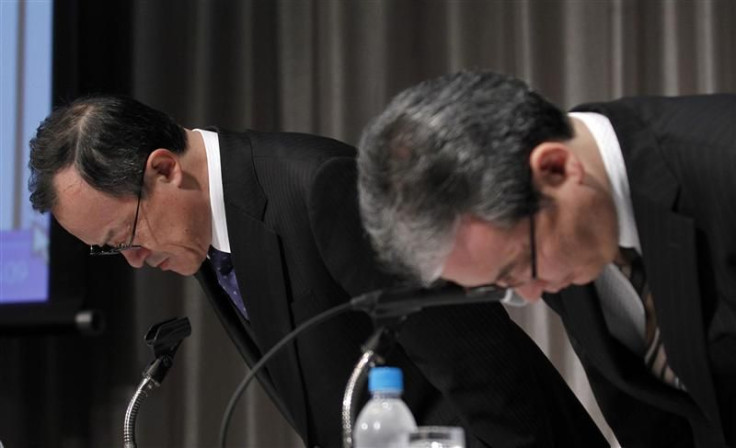Olympus Board Signals it will Quit

(REUTERS) -- Olympus Corp's board signaled plans to quit over a $1.7 billion accounting fraud, but will likely pick a team of potential successors, triggering a battle for control of the Japanese firm with the former CEO who blew the whistle on the scandal.
At a news conference Wednesday, Olympus said one director had resigned, others may follow, and the entire board could go once the firm submits its second-quarter earnings, due by Dec. 14, and takes steps to put the disgraced company back on track.
An external investigative panel report, unveiled on Tuesday, concluded that several former executives spent 13 years running a complex scheme to hide huge investment losses off the company's balance sheet.
Our corporate governance was severely criticized. As the representative of the company, I apologize sincerely, Olympus President Shuichi Takayama told reporters.
Ex-CEO Michael Woodford, fired in October after questioning murky M&A deals, is campaigning to return to head up the 92-year-old maker of cameras and endoscopes and has called for an extraordinary shareholders' meeting to pick a new board.
BATTLE FOR CONTROL
Takayama, who took over after the scandal broke, said the earliest such a meeting could be held was late-February, and the management wouldn't resign before then -- after picking its own slate of candidates.
We are still considering the plan (for a new president) that we will submit ... We don't know what Mr. Woodford is thinking, but he has said he will pursue a proxy fight, so we think there will certainly be a proposal, Takayama said.
We will have the shareholders meeting decide, he said, although he gave a nod to whistleblower Woodford for pointing out problems that the current board failed to do.
Olympus also set up an outside committee to advise whether to file criminal complaints or sue those responsible for the scandal, which has halved the value of the firm's shares and fanned fears about Japan's corporate governance generally.
We deeply regret that we have given a very negative impression to Japan and possibly the world, a grim-faced Takayama said.
Announcing the new committee, which is to report its recommendations by January 8, the once-proud firm also said that senior executive director Makoto Nakatsuka had quit the board, the third to do so since the scandal erupted.
Nakatsuka was found on Tuesday to have helped the two main architects of the cover-up, former internal auditor Hideo Yamada and ex-executive vice president Hisashi Mori, to manage Olympus's financial assets in the late 1980s, when it embarked on risky investments that led to the losses.
Olympus, which still risks being kicked off the Tokyo stock market and forced into a humiliating sale of core assets, said it would set up a second external panel to examine the responsibility of the firm's auditors.
LEGAL ACTION MAY FOLLOW
The damning report on Tuesday, prepared by outside legal and accounting experts, said Olympus management was rotten to the core, ruled by a culture of absolute corporate loyalty and a desire to flatter financial performance.
Takayama has already said Olympus will consider legal steps, including criminal complaints, against those found responsible.
He has blamed Mori and Yamada for masterminding the cover-up, and the panel found that two former company presidents were also told of the concealment.
Olympus faces a number of hurdles in its struggle to survive.
It must meet next week's deadline for submitting its results for the six months to end-September -- a task that requires combing through and sorting out decades of cooked books.
Even if it meets that deadline, the Tokyo Stock Exchange could still delist Olympus shares depending on the scale of the previous financial misstatements.
Takayama said that as far as he knew, Olympus' liabilities had not exceeded assets at any point since 2000, but admitted the firm's capital situation was tough and it might sell assets or accept a capital tie-up with another firm.
We haven't decided our direction on that at this point but, as you mention, the capital situation is very difficult. Therefore, we can't deny that this is a possibility. If there is such an opportunity, we would like to consider it, he said.
One of the few glimmers of hope from Tuesday's panel report was its conclusion that there was no evidence of a much-rumored link between the scandal and organized crime.
If a link were found -- and police are still investigating -- Olympus would likely be delisted from the stock market.
Police, prosecutors and the securities watchdog are still probing the Olympus affair and are expected to step up their investigations now that the independent panel has issued its report.
(Additional reporting by Mari Saito; Writing by Linda Sieg and Mark Bendeich; Editing by Ian Geoghegan)
© Copyright Thomson Reuters 2024. All rights reserved.











